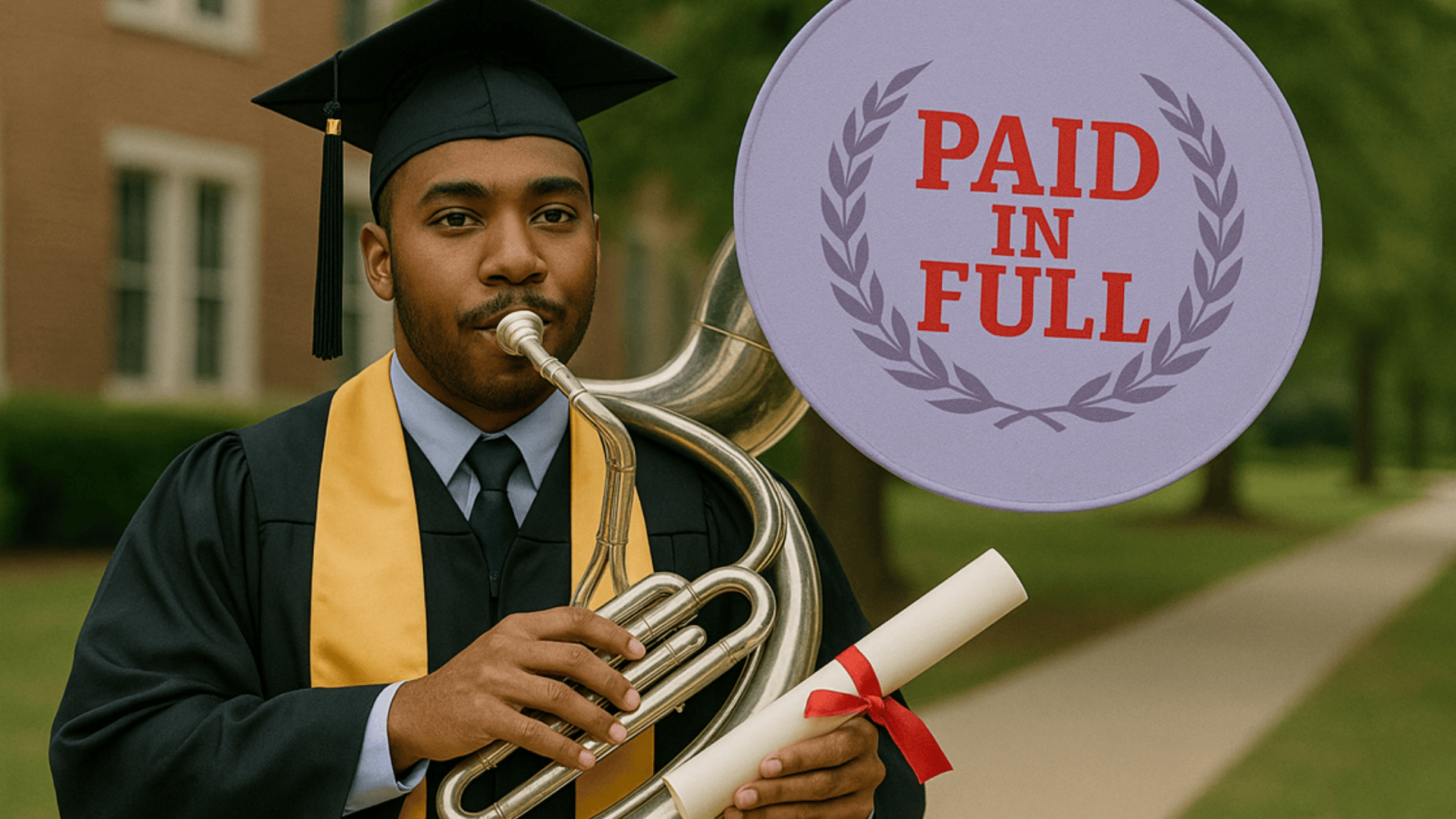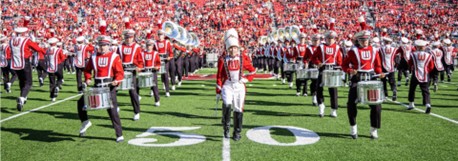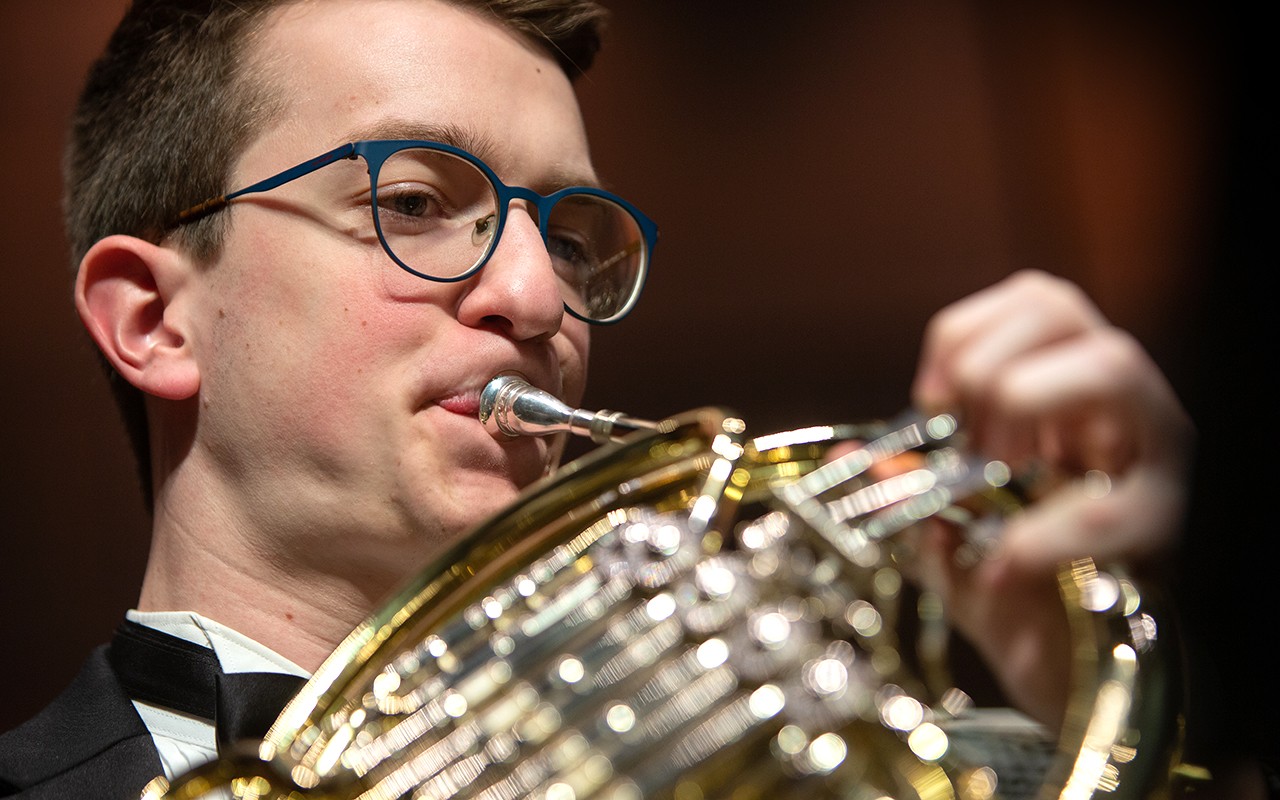Beyond Practice: The Strategic Advantage of Private Music Lessons
The Competitive Advantage Most Student MusiciansOverlook — and Why It Matters More Than Ever in Collegiate Music Admissions and Scholarships.
Read More
AccoladiTeacher.com is designed specifically for performing arts teachers, giving you access to resources that help guide students and their families through every step of the collegiate journey: from school selection and applications to auditions, scholarships, and acceptance.
While teachers are at the heart of this site, we also support students, parents, collegiate and summer enrichment recruiters, and school district fine arts directors. To ensure each community has a dedicated space, we've created tailored websites:
Performing Arts Teachers: this is your home base. Please continue your registration here on AccoladiTeacher.com.
Everyone else: begin your journey at the site designed for your role.

Because your music opens doors—and now, it might just cover your tuition too.
What if your talent in music could open the doors to some of the best colleges in the country—without the overwhelming price tag?
Across the U.S., more than a dozen elite universities and music conservatories now offer full-tuition programs for students from working-, middle-, and lower-income families. These programs are designed to make college more accessible for those with household incomes between $75,000 and $200,000 per year—but here’s the truth:
If your family earns less than $75,000—or even less than $40,000—many of these schools may cover far more than just tuition. That could include housing, meals, books, transportation, and more. Some even eliminate student loans entirely.
So don’t count yourself out. These programs aren’t just for “upper-middle-income” students—they’re for anyone with talent, drive, and the commitment to grow.
Even better? Nearly all of these colleges offer a music major, conservatory-level training, or pre-professional performance tracks. If music is your passion, these schools want to invest in your future.
Here are some of the top colleges and conservatories offering free or nearly free tuition—plus exceptional music programs:
.png) ARTICLE GLOSSARY
ARTICLE GLOSSARY
Audition: A performance evaluation used by colleges, conservatories, and music programs to assess a student’s musical ability. It’s often required for admission into music majors.
College Conservatory: A specialized school (often part of a university or independent) that offers intense, performance-focused training for musicians, dancers, and actors—such as Juilliard or the Shepherd School at Rice.
College of Liberal Arts: A university division that focuses on a broad education, including humanities, sciences, and arts. Many schools offer music degrees within their liberal arts program (e.g., Harvard, Stanford).
Cost of Attendance (COA): The full yearly cost of college, including tuition, room and board, books, supplies, travel, and personal expenses.
CSS Profile: A financial aid form required by many private colleges in addition to the FAFSA. It helps determine how much a family can pay and what grants/scholarships the student may receive.
Demonstrated Financial Need: The difference between a college’s cost and what a family can reasonably contribute. Many top schools commit to meeting 100% of this need through grants, not loans.
External Scholarships: Scholarships from organizations outside the college (e.g., Rotary Club, church groups, arts foundations) that help cover college costs.
FAFSA: The Free Application for Federal Student Aid, a government form used to apply for federal and state financial aid, including grants, loans, and work-study programs.
Federal Work-Study: A program that allows college students to earn money through part-time jobs on campus to help pay for college expenses.
First-Generation College Student: A student whose parents or guardians did not complete a four-year college degree. Many schools offer extra support for these students.
Full Cost-of-Attendance: When a college not only covers tuition, but also room, board, books, and other expenses through financial aid or scholarships.
Full Tuition: When a student’s tuition fees are completely covered by grants or scholarships, either through school programs or external funding.
Grants: Money for college that does not need to be repaid, often based on financial need.
Loan-Free Financial Aid: A financial aid package that replaces loans with scholarships or grants so students graduate without debt.
Music Major: A student who is earning a college degree in music—such as performance, music education, composition, or musicology.
Music Portfolio: A collection of performance videos, awards, programs, and teacher recommendations that represent a student’s musical achievements—used during the college application and audition process.
Performance Degree: A music degree focused on developing high-level skill on an instrument or voice, preparing students for professional careers on stage.
Room and Board: The cost of housing (dorm room or apartment) and food during college.
Scholarship: Financial support given to students based on talent, academics, financial need, or other achievements—does not have to be repaid.
Title I Campus: A public school that receives extra federal funding because a large percentage of its students come from low-income households.
Tuition-Free Program: A college financial aid model where students do not pay tuition—typically based on family income levels and/or academic merit.
Work Ethic: A student's discipline, responsibility, and persistence in practicing, studying, and showing up prepared—crucial for success in competitive music programs.
Objective: Students will explore how musical talent can help pay for college, learn about tuition-free schools with music programs, and reflect on how college can be possible for students from all income levels.
Assignment: “Music Can Open College Doors”
Grading Rubric (20 Points)
| Criteria | Excellent (5) | Good (4) | Needs Work (3 or below) |
|---|---|---|---|
| College Information | All info is clear and correct | One or two details missing | Most info missing/confusing |
| Understanding of Tuition Help | Clearly explains help offered | Somewhat clear | Unclear or missing |
| Cool Fact or Person | Interesting fact clearly shared | Fact included but vague | No fact or unclear |
| Reflection Paragraph | Thoughtful, life-connected | Some connection made | Unclear or not full sentences |
Objective: Students will analyze and compare tuition-free or high-aid universities that offer strong music programs. They will identify opportunities based on family income levels and reflect on how financial aid impacts their personal college goals, especially as a performing arts student.
Assignment: “Your Future, Tuition-Free”
Grading Rubric (20 Points)
| Criteria | Excellent (5) | Good (4) | Satisfactory (3) | Needs Improvement (2 or below) |
|---|---|---|---|---|
| Understanding of College Programs | Accurate and in-depth for both colleges | Minor issues with one school | Lacks detail | Incomplete or incorrect info |
| Explanation of Aid Policies | Fully explains policies | Mostly clear | Mentions aid, unclear | Inaccurate or missing |
| Reflection Paragraph | Insightful, personal | Some insight | Basic or vague | No insight or connection |
| Presentation/Neatness | Well-organized, minimal errors | Mostly neat | Some errors or disorganization | Messy or unclear |
Start your college journey with confidence!
Browse our library of helpful articles and directories made just for performing arts students and their families. Whether you're choosing a school, planning campus visits, preparing for auditions, applying for scholarships, or getting ready to submit applications—this is your go-to place for everything college.

.png)
The Competitive Advantage Most Student MusiciansOverlook — and Why It Matters More Than Ever in Collegiate Music Admissions and Scholarships.
Read More
Explore how combining music with another field can open doors to exciting career opportunities.
Read More
Get ahead in your music education journey with strategic dual enrollment opportunities.
Read More.jpg)
Discover proven strategies to build meaningful relationships with college music departments before you apply.
Read More.jpg)
From Baroque to modern, fast to lyrical—contrasting solos reveal a musician's full range in college auditions.
Read More
Discover why mastering just a few bars of music can make or break an audition and reveal your potential.
Read More.jpg)
Make a great first impression with proper college visit etiquette and smart questions.
Read More
A comprehensive roadmap to navigate the music school application and audition process successfully.
Read More.png)
Sometimes the smallest gestures-like a simple thank-you -- open the biggest doors. Discover how one note of gratitude changed everything.
Read More
Discover how college fairs tailored for music students can open doors to top programs and help you make meaningful connections before you ever audition.
Read More
Private music lessons do more than sharpen skills — they unlock opportunity. Discover how one-on-one instruction builds confidence, hones performance, and opens doors to college auditions and scholarships.
Read More
Packed with proven strategies, expert insights, and inspiring real-life stories, it empowers musicians to turn performance anxiety into confident, expressive auditions.
Read More
Discover how marching band can do more than make music—it can open doors to scholarships, leadership roles, and life-changing opportunities.
Read More.jpg)
Where nerves meet opportunity, growth begins. Discover how one powerful experience can elevate your student’s talent—and their college application.
Read More.png)
Professors don't just admit talent—they choose students they won't mind teaching every Tuesday morning before coffee, touring Europe with next spring, and introducing to their colleagues without bracing themselves first.
Read More
Think a music degree is out of reach because of cost? Think again. Whether you're aiming for college scholarships or exploring grants from arts organizations, this guide helps you uncover the many ways to fund your passion — and shows why applying early and often is the key to making your musical dreams a reality.
Read More
From nerves to notes, this guide helps student musicians face audition day with clarity, confidence, and control.
Read More
Shedding light on the financial freedom performing arts students deserve—and the billions in performing arts scholarships many never knew existed
Read More
Talent is just the beginning. Learn how the right moves today—owning your child's UTL name, building their brand, and shaping their story—can set your young performing artist on a path to lasting stardom.
Read More
From first solo to final audition—how a carefully curated repertoire list becomes a student’s personal record of growth, readiness, and artistic identity.
Read More
Don't let travel troubles ruin your big audition! This guide has everything you need to ensure you and your instrument arrive.
Read More
Discover how decoding a composition’s name can elevate your performance, impress adjudicators, and help you stand out from the competition.
Read More
How one meaningful connection with a music teacher can open doors to college, scholarships, and a lifelong mentorship — starting now.
Read More
You don’t need fancy gear to capture talent — just these smart, affordable tips that could turn an audition video into a scholarship-winning performance.
Read More
Discover why a liberal arts education isn’t just about academics—it’s a powerful launchpad for aspiring musicians to thrive in every stage of their careers.
Read More.jpg)
Choosing the right music degree isn't just about a major -- it's about mapping the future of your artistry. Discover the key differences between BM, BA, BFA, and BS programs and find your perfect path.
Read More
From educators, performers, and industry insiders who got tired of hearing “music isn’t a real career” and decided to answer with Broadway box-office receipts, royalty checks, and Grammy paydays.
Read More
Where Purpose Meets Performance: How Service Can Help Pay for Your Music Degree.
Read More
For those navigating the leap from talent to training and tuning both heart and mind to what’s next—this is your guide to finding the path that fits, connects, and inspires.
Read More.jpg)
A month-by-month roadmap designed to help aspiring music majors confidently prepare for college auditions—one scale, solo, and strategy at a time.
Read More.jpg)
Beyond the Name: Finding the Place That Helps You Find Your
Read More.jpg)
Discover the real perks, the hidden costs, and how to tell if coaching is the right
Read More.jpg)
Mastering college applications means mastering deadlines. Success hinges on precision, preparation, and unwavering commitment to each institution’s unique demands.
Read More.jpg)
Because affording your dream school shouldn't be a dream.
Read More
Where passion meets purpose — discover how talented musicians turn their love for music into a professional career serving their country.
Read More.png)
The music industry fuels the U.S. economy, driving schools to recruit creative, business-savvy students. Scholarships now target songwriters.
Read More.png)
How young artists can launch their careers and travel the world — without a college degree.
Read More
Because your talent deserves more than applause, it deserves a paycheck.
Read More
It’s not about impressing—it's about expressing.
Read MoreThe Accoladi Research Team is constantly tracking trends in performing arts collegiate recruiting, documenting scholarship procurement processes, and uncovering new resources for students and families. From the latest audition requirements to insider tips on securing funding, we’re always expanding our library— so, you can make informed choices with confidence.
